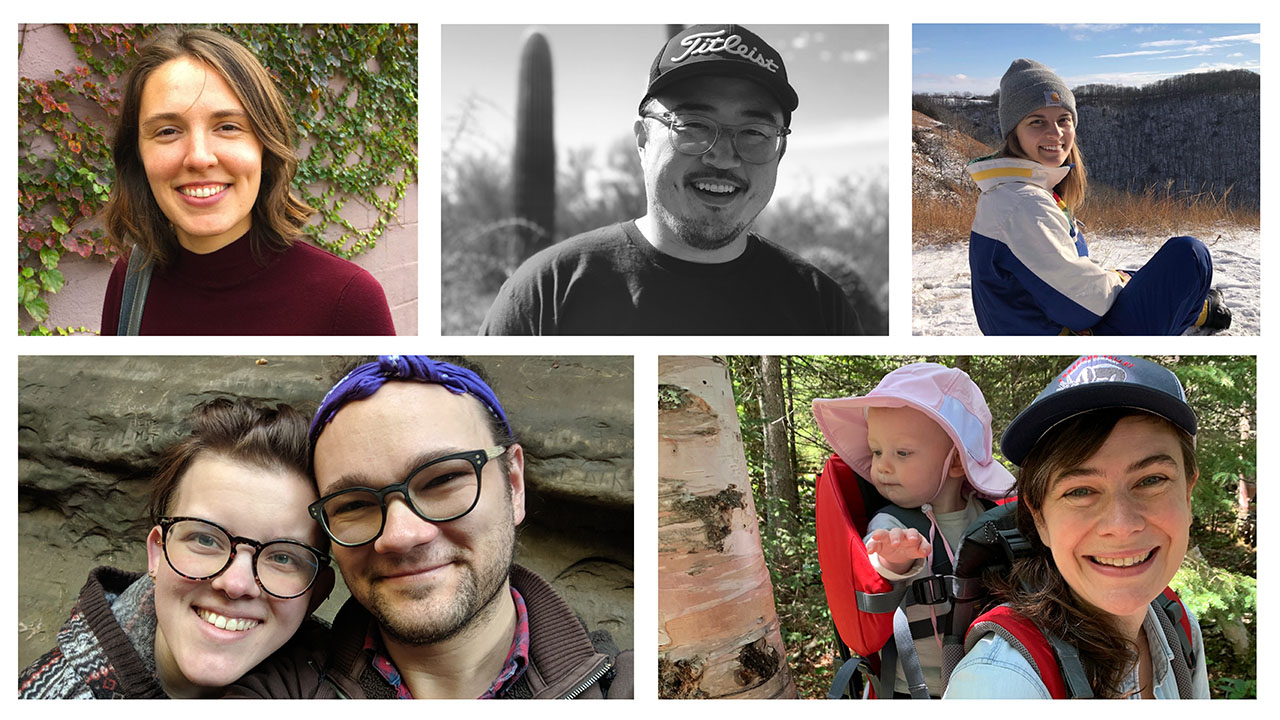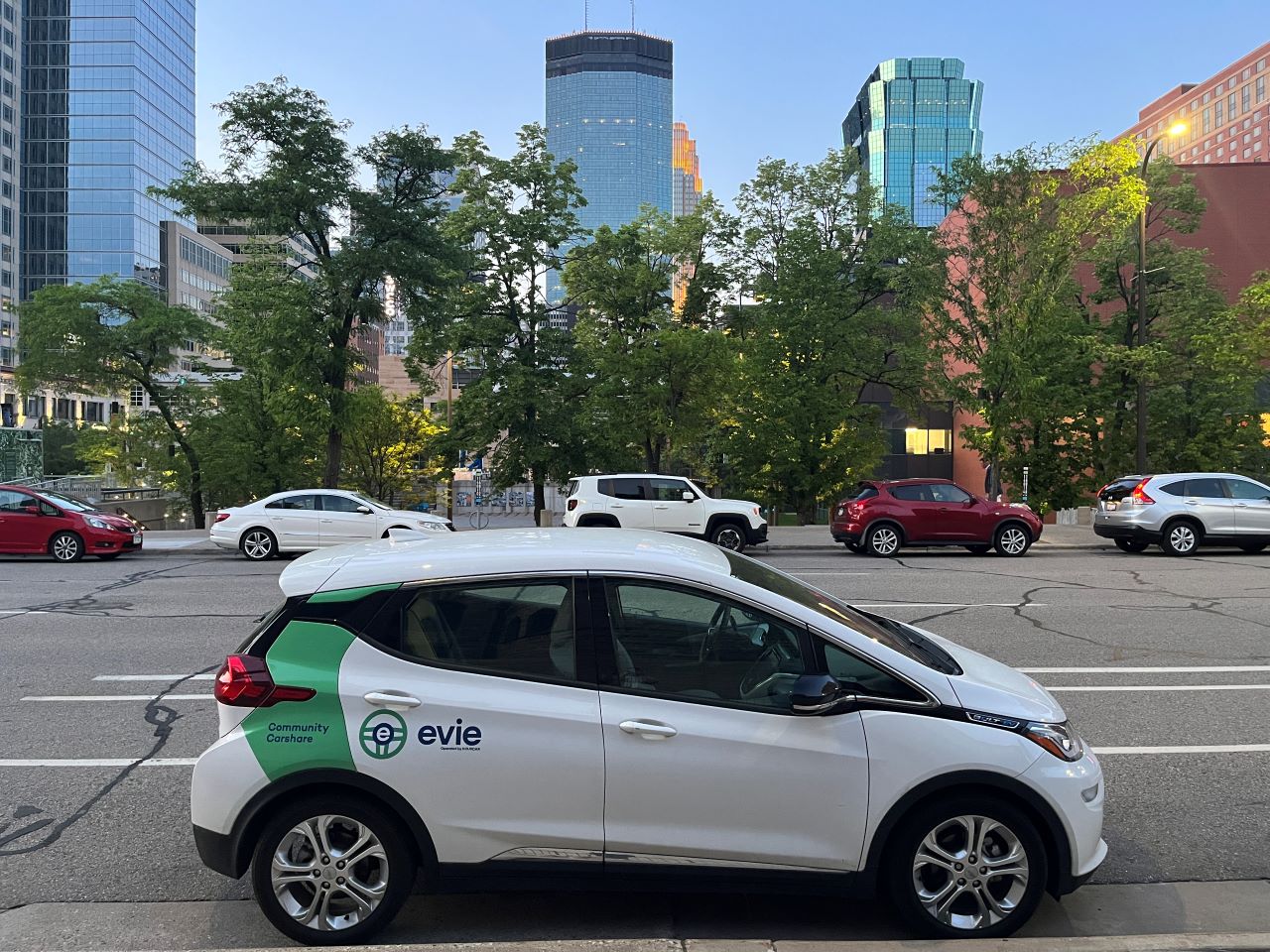
Fresh Energy’s growing team of technical experts, attorneys, and advocates has made the organization a critical player in speeding Minnesota’s transition to a clean energy economy. As the climate movement has evolved over the course of our 30-year history, so has our programmatic work. Today, crucial moves to drive innovation and impact as we shift our economy away from fossil fuels to clean energy are driven by Fresh Energy’s Energy Transition team. Margaret, Eric, and Caitlin are working every day to ensure that our climate and clean energy advocacy blends energy efficiency, strategic electrification, innovation, and more across Minnesota’s industrial, transportation, agricultural, and building economies. Let’s meet the team!
Values, then and now
Led by Senior Lead, Innovation and Impact Margaret Cherne-Hendrick, PhD and driven by the work of Senior Policy Associates, Buildings Eric Fowler and Caitlin Eichten, our Energy Transition team has evolved over the years to meet the greatest needs as we look toward and plan for our clean energy future. Just how did the team initially find their way to climate and clean energy advocacy?
Eric Fowler

“I have a number of memories that really stand out to me,” Eric says. “I don’t think I’m the only one who had a little bit of an awakening when I saw “An Inconvenient Truth” in high school, and the point was really driven home with the flooding that occurred the year I graduated from high school in my hometown of West Fargo, North Dakota.” The flooding was bad enough that Eric recounts he and some of his classmates lobbied to get out of class to volunteer sandbagging because so many homes were threatened by the floodwaters. “Even if we couldn’t pinpoint that specific flood to climate change,” he says, “I understood that disasters like that were only going to accelerate because of climate change.”
Having initially filled roles on both Fresh Energy’s Public Affairs and Energy Transition teams, particularly driving communications and coalition management for the Midwest Building Decarbonization Coalition, Eric is excited to be settling fully into his new role on the Buildings team. “My dad, for my entire living memory, worked as a building maintenance engineer. I appreciate that the work I get to do now is not only helping move our economy and society in a more sustainable direction, but that I am also getting to experience—although from a different perspective—what my dad spent most of his career thinking about.”
Caitlin Eichten

Family also played a big role in Caitlin’s journey to clean energy and climate advocacy. “My care and concern for the health of our environment and communities really stems from my mom and her side of the family.” Growing up in Minnesota, Caitlin spent a lot of time visiting family members in the Driftless Area of northeastern Iowa who own and run sustainable, organic farms. “I’ve always been inspired by the work that they do and our family’s history and connection to that land. Those visits helped to instill in me the values of caring for your land and surrounding environment, your communities, and future generations.” College introduced Caitlin to even more perspectives on environmental studies and climate change: “Even though I was a math/statistics major, I had the opportunity to take classes on environmental law and policy, the economics of climate change, environmental chemistry and biology, and more that demonstrated how interdisciplinary climate change is, which goes to show how we can all bring our various strengths to this work.”
Margaret Cherne-Hendrick

“I grew up in Oregon and Washington,” Margaret says, “camping and canoeing out in the Cascade Mountains and surrounding areas. And I always had a strong love for the environment, which continued via a biology degree during my undergraduate studies.” For a while, Margaret was sure that she’d be a plant evolutionary biologist and geneticist. Instead, she found herself thinking more about climate change and its impacts. “So, I threw in the towel on what I had planned and got into more applied research on energy and climate,” she says, “spending a lot of time looking into natural gas and how we can change the paradigm so that we rely on it less and can mount this really large, and truly possible, energy transition. That landed me in this line of work and led me to Fresh Energy.”
A dynamic approach to the work
Thanks to each of their individual experiences, Margaret, Eric, and Caitlin are now able to bring their varied expertise to their work at Fresh Energy, overseeing the organization’s work on strategic investments and opportunities that shift us to a clean energy economy.
“Our team is awesome because we are at that leading edge of the movement,” Margaret says, “working to decarbonize sectors of the economy that have historically not received as much attention, both from the public and also in Fresh Energy’s portfolio of work.” She adds, “Our work is aimed at thinking about how the transportation sector, the buildings sector, and the industrial sector collide, and how to mount an equitable and effective transition to achieve carbon-neutral economies by 2050 in those harder-to-decarbonize spaces of our economy here in Minnesota and beyond.”

The Energy Transition team is very dynamic in that everyone on the team is here to push and get to work transitioning sectors of the economy that society hasn’t always paid attention to but that touch our lives every day. And it helps having folks on the team who are technical-minded, as well as folks who are rooted in advocating and campaigning to get everyday people involved in this movement. Trying to solve these often really difficult problems can’t be done through a one-size-fits-all, cookie-cutter approach. So, this team aims to celebrate their different skill sets and different personalities while working toward the same goal.
“There are a number of different avenues we take to support our work,” notes Caitlin. “From the regulatory side to legislative advocacy to community engagement that occurs at regional, state, and local levels—our interdisciplinary approach really lends itself to the different needs in our program focus areas.” In Margaret’s words, “Society often approaches the energy transition in a siloed way. Our team is presenting a model of a multifaceted, economy-wide transition that we should be paying attention to, so that we can have the conversation at a more national level about how that multifaceted approach can serve us all.”
Building the road to long-term, economy-wide decarbonization
A key priority throughout the first part of 2022 was to assemble the full team and ensure everyone moving into a new role was up to speed on the full breadth of the Energy Transition team’s work. That meant the team was ready to push ahead in the second half of this year and well into the future. Fresh Energy launched the Buildings Department in early June 2022, and, since then, the team has been hard at work strategizing, planning, and advocating alongside members of other Fresh Energy teams to ensure everyone who calls Minnesota home can benefit from an equitable, affordable, and abundant transition to a clean energy economy.

The team has really honed in on finding opportunities to further decarbonize Minnesota’s transportation sector. Things are moving on the building energy codes front as well, Eric points out. “Right now,” he says, “the Minnesota Department of Labor and Industry is evaluating a set of building codes that would really modernize the way Minnesota plans, constructs, and maintains various types of buildings. We hope to have more to report on building codes soon. We’re also thinking about what else we want to work on that complements the ‘bread and butter’ issues that are permanent fixtures for our team.”
“There are a number of emerging areas of work within our imperative,” Margaret adds. “Looking at the year ahead, I’m really excited to build out our work on industrial decarbonization—there are some really cool projects in the hopper, especially around clean fertilizer, and we can’t wait to bring someone on board to take on that area of work and expand the depth and breadth of our team.”
Fresh Energy is committed to using high-impact, equitable solutions to achieve carbon neutrality across the economy. Our work driving the clean energy transition is one that requires a broad range of strategies at the local, state, and regional levels, and our Energy Transition team is primed to collaborate with and support folks far and wide who have a role to play in cutting carbon emissions, improving health outcomes, creating new businesses and jobs, and reducing costs for Minnesotans over the long term.
As Fresh Energy celebrates 30 years, we are shining the spotlight on the teams of staff that are carrying forward Fresh Energy’s long legacy of supporting an equitable, clean energy future for Minnesota and the Midwest.
